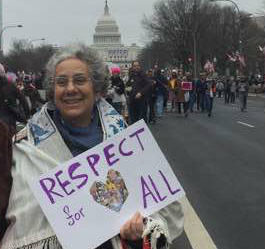Commentary on Parshat Bo (Exodus 10:1 – 13:16)
I am usually one to heed a call to mobilize for justice and human rights. I participated in a peace delegation to Israel and Palestine at the beginning of the Second Intifada and was at Standing Rock for the clergy action against the Dakota Pipeline. But lately, I have not been able to move my body to the border in solidarity with refugees looking for asylum. My head tells me I need to be there, but I can’t seem to move. It is like I am under a plague of darkness.
Parshat Bo, which we read this week, includes just such an immobilizing plague of darkness. We are told in the Torah that the Egyptians were enveloped in a darkness where “…a person could not see their friend and no one could get up from where they were” (Exodus 10:23). I have some sympathy for the Egyptians here. I can’t seem to get up and move either.
Rabbi Harold Kushner writes in his commentary to this passage, “Perhaps the Egyptians were depressed by the series of calamities that had struck them” (Etz Hayim, p. 377). I think this may be part of what is ailing me. I have found myself feeling overwhelmed and helpless ever since the week in October that brought us the killing of two African Americans in Kentucky, the killing of 11 Jews in Pittsburgh, an attack on the legal protections for transgender folk, bombs sent through the mail and thousands of refugees from Central America walking toward our border, hoping for asylum. This was not a week that one could “just get over.”
Sign up to receive Torah from T’ruah in your inbox each week.
Kushner goes on to speculate that the Egyptians might have been depressed “by the realization of how much their own comfort depended on the enslavement of others.” As American Jews, many of us are kind of like Egyptians when it comes to immigrants. Who indeed serves our food, mows our lawns, takes care of our elders and babies, act as security guards for our houses of worship? We are part of this government that is being run by a would-be Pharaoh. It is easy to understand how we might become depressed and therefore immobilized by the darkness that surrounds us.
However, Kushner gives us an interpretation of a story from the Talmud that points to a way out. In Berachot 9b, we find a Talmudic debate on when it becomes dawn. Is it when we can distinguish between a bundle of blue and a bundle of white cloth? Between a wolf and a dog? A domesticated donkey and a wild one? The Talmud concludes that it is when we can recognize the face of a friend. Kushner expands and deepens this to say that dawn arrives when we can recognize any human being as a friend.
This points us to a way out of the darkness and isolation that depression breeds. And indeed, many Egyptians were able to make this transition by giving the Israelites gifts of gold and silver as they are exiting Egypt (Exodus 12:35-36). By sharing their wealth with a previously enslaved population, they created the material basis for those people to survive.
Find more commentaries on Parshat Bo.
There is another group of Egyptians who go even further. They actually join the Israelites on their way out of Egypt, throwing their lot in wholesale. In the Torah they are referred to as “a mixed multitude” (Exodus 12:38). We can speculate that the Egyptians who joined the Israelites also thirsted for freedom. There are even those who believe that Moses’ adoptive mother — Pharaoh’s daughter — was among this mixed multitude, based on the Midrash that she did not die as a first born Egyptian (Exodus Rabbah 18:3). One reason we might want to join with immigrants today is because we thirst for a compassionate and just country.
 This mixed multitude is a great image of the all-inclusive diversity we need at the border and in our towns as we stand and work in solidarity with new immigrants, who are refugees from the slaveries of poverty, violence, domestic abuse and the pharaohs of this world. Just imagining this mixed multitude brings back to me the times I have marched or stood with diverse people and reminds me that I am not alone. That in turn helps me to know that I will again become active. Perhaps by the time you are reading this we will meet on the border.
This mixed multitude is a great image of the all-inclusive diversity we need at the border and in our towns as we stand and work in solidarity with new immigrants, who are refugees from the slaveries of poverty, violence, domestic abuse and the pharaohs of this world. Just imagining this mixed multitude brings back to me the times I have marched or stood with diverse people and reminds me that I am not alone. That in turn helps me to know that I will again become active. Perhaps by the time you are reading this we will meet on the border.
***
To support recent immigrants, consider a donation to the San Diego Rapid Response Network.
Rabbi Rain Zohav has most recently been rabbi and spiritual adviser to the Interfaith Families Project of Greater Washington, DC and serves as the chair of the Tikkun Olam Committee of Ohalah, the Professional Association of Renewal Clergy.

